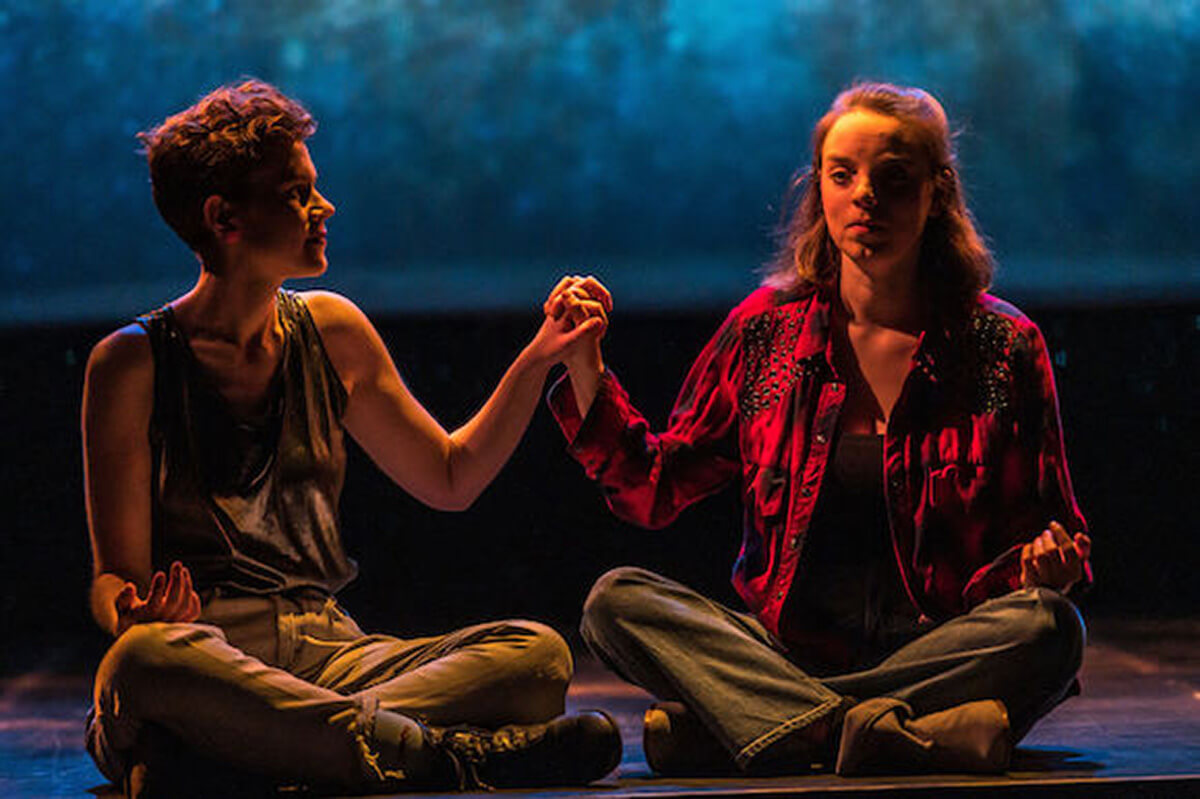
In an age of edgy drama and raucous music, Pomegranate, at Buddies in Bad Times Theatre, makes a remarkably lyrical impression. Like many of its 18th-century precursors, this new opera is set in ancient times, at least in Act 1, which unfolds in Pompeii while Mount Vesuvius rumbles ominously in the background. Act 2 recounts the recent past in downtown Toronto, when police raids on bathhouses were still in the collective memory and the Fly by Night bar was one of the few safe spaces for lesbians to socialize.
Connecting these apparently unrelated worlds are the principals, Cassia and Suli, who fall in love in 79 AD as pomegranate-pickers and fellow initiates of a female mystery cult, then meet some 1,900 years later as Cass and Suzie, vaguely sensing their prior acquaintance. Heterosexual forces intervene in both eras, earlier in the person of Marcus, a Roman centurion who falls for Suli and disapproves of cults; and later by Suzie’s relatives, who hope to dissuade her from her rebellious course.
As fanciful as all this sounds, it was plausible on a poetic plane, and the two acts seemed justly balanced in performance. Music by Kye Marshall for a small ensemble evoked the ancient world through modal melody and the almost mandatory devices of harp, flute, oboe and English horn, with cellos adding elements of drama (and smartly imitating a swarm of bees unleashed on poor Marcus). After intermission, the sounds naturally became urban, with keyboard and saxophone in the mix. Nevertheless, the texture remained through-composed and lyrical. The high-end pop idiom of Michel Legrand could be evoked as a point of comparison.
Singing in Pompeii was perhaps not always ideally sustained: A few potential arias stopped just as they were ready to take flight. Episodes tended to end abruptly. The extended love scene — wisely left wordless — lacked a musical trajectory and climax. Marshall here offered generalized support. Or am I imposing on Pomegranate an irrelevant erotic paradigm?
Vocals in the second act were more continuous and numbers easier to isolate by ear. A sequence of dancing fit the scenario perfectly. Like many a classical opera, this one comes with a ballet. Like only a few, it offers a wistful epilogue to send the crowd (substantial on Thursday) away in a hopeful mood.

There were good efforts from the cast (soprano Rebecca Gray, mezzo-soprano Camille Rogers, soprano Teiya Kasahara, mezzo-soprano Stephanie Tritchew and baritone Aaron Durand), all of whom in Act 2 were cleverly doubled as their counterparts in Act 1. Amanda Hale’s words were warm rather than flowery. Interludes of joy and foreboding were well timed.
A villain is useful in opera to move the plot forward. Marcus (who rematerializes in Act 2 as Suli’s scandalized uncle) filled the bill. Credit the creators for giving this character human traits. Still, I had a sense that Marcus might have been split into two roles — a sympathetic tenor and a dastardly baritone. Durand’s diction was excellent. Comprehension overall ran well above the norm. We did not miss surtitles too keenly.
Sets and costumes (Rachel Forbes) were appropriate and projections (Laura Warren) seemed all the more evocative for not being self-consciously high-tech. The musicians (among whom harpist Kristan Toczko, carrying the world on her shoulders in Act 1, must be mentioned) were confidently led by Jennifer Tung. Director Michael Hidetoshi Mori ably distinguished the idealized style appropriate to the antique setting from the verismo atmosphere of Act 2.
Pomegrante runs a little over two hours, depending on the length of the intermission. Acoustics in Buddies in Bad Times are better than those of some theatrical spaces.
Of course, this piece is pitched to the LGBTQ community. Pride Toronto is a sponsor. In both acts, the love of Cassia/Cass and Suli/Suzie is portrayed as forbidden. Their quest to express that love freely animates the narrative. Still, Pomegranate remains stubbornly universal in its message. Which is to say, it is a successful opera.
Pomegranate plays Saturday at 2 and 7:30 and Sunday at 2. See here for details.
LUDWIG VAN TORONTO
Want more updates on classical music and opera news and reviews? Follow us on Facebook, Instagram or Twitter for all the latest.
- SCRUTINY | Toronto Symphony Orchestra’s Messiah Covers The Basics, But Misses On True Holiday Magic - December 17, 2025
- FEATURE | Canadian Pianist Élisabeth Pion Takes Honens Piano Gold In Calgary - October 27, 2025
- FEATURE | The Honens International Piano Competition Does Things A Little Differently - October 22, 2025



